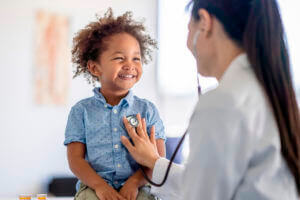
As your child grows, their health needs will change. They’ll need different vaccinations and may develop new allergies or chronic conditions. It’s important to have a doctor who knows your child well and can provide the best possible care as their needs evolve.
Your child’s doctor can also be a valuable resource for you as a parent. They can offer guidance on everything from nutrition to behavior to development milestones. If there are ever any concerns about your child’s health, you’ll have someone you trust to turn to for answers.
When it comes to your child’s health, you want to make sure that everything is okay. Here are the five most common questions that doctors ask about your child.
1. How Is Your Child Eating?
This question is important because it can help the doctor gauge whether or not your child is getting the nutrients they need. Your child is still growing, and their nutritional needs are different from yours. The doctor can provide recommendations, so your child eats for optimal health. Some children grow and develop at a slower pace than most others. Sometimes, the underlying cause is concerning. This question can help highlight if your child may have a nutritional deficiency or if something else is causing weight or growth problems.
2. How Often Does Your Child Urinate?
This question helps the doctor determine if there are any problems with kidney function or urinary tract infections. Normal urination frequency in children can range from once every hour to several times per day. Healthy children over the age of four should have at least one bowel movement per day.
3. Does Your Child Have Any Allergies?
Allergies can cause serious problems in very young children, so it’s important for doctors to know if your child has them. Common symptoms of allergies in children include a runny nose, sneezing, congestion, and itchy eyes and throat. Some children may also experience hives, rashes or wheezing, and difficulty breathing. The doctor’s recommendations will depend on the information you provide, and may include allergy testing if they suspect allergies. This is to ensure your child receives proper treatment and is able to manage their allergies well.
4. What Medications Does Your Child Take Regularly?
Some medications can interact badly with others, so it’s crucial that doctors know what meds their pediatric patients are on. Certain types of drugs also carry higher risks in children such as aspirin, non-steroidal anti-inflammatory drugs (NSAIDs), and certain antibiotics, which can cause allergic reactions. Your child’s doctor should know every type of medication, including vitamins and supplements, your child is taking.
5. Is There Anything Worrying You About Your Child’s Health?
Doctors want to know if parents have any concerns, so they can address them and put minds at ease. Common childhood doctor questions cover areas such as behavioral issues, socialization, and academic performance, as these are equally important aspects of your child’s health and development.
Experienced Primary Care Doctor in West Orange, New Jersey
Hudson MD Group of northern New Jersey is a multi-specialty practice with a large number of primary care doctors on our team. Our primary care doctors provide for the needs of the entire family and are committed to the health of your little one. Call our office today at (973) 705-4914 or send us a message using our secure online form. Hudson MD Group has several locations in West Orange, and we look forward to seeing you in the location nearest you.


